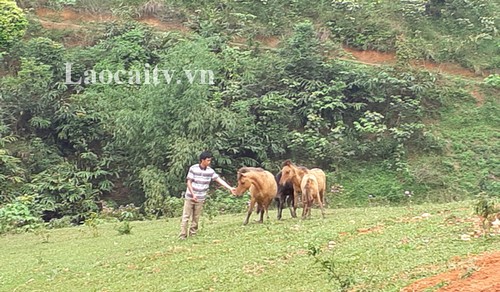 Trieu Van Ngan, a Tun Tren villager, is feeding horses which bring his family a stable income source. (Photo: Phuong Lien/Laocaitv) Trieu Van Ngan, a Tun Tren villager, is feeding horses which bring his family a stable income source. (Photo: Phuong Lien/Laocaitv) |
The lives of the hard-working Dao ethnic people in Tun Tren hamlet began to change when they started receiving support from agricultural projects.
In 2015 the Lao Cai’s Farmers Association launched a project to raise pack horses. With a preferential loan and the family's savings, Trieu Van Ngan, a Tun Tren villager, bought 3 mares. Three years later, Ngan earned nearly 2,800 USD by selling the stallions he had bred.
After paying off his loan, Ngan still owns 3 mares plus 5 buffalo cows. Since the animals eat only natural grass, his family has few expenses except for grazing fees. The sustainable income provided by this model has raised Ngan's family out of poverty to become one of the better-off households in the hamlet.
“My family had 2 horses and then bought an additional 3 mares with the help of the project’s preferential loan. Each year we sell a couple of horses, earning about 800 USD for a large horse and about 650 USD for a small horse. We use traditional methods of raising horses,” said Ngan.
Animals raised in Tung Tren hamlet graze on natural meadows - an advantage which provides the villagers sustainable income and keeps them out of poverty.
To boost the villagers’ incomes, the Duong Quy communal Farmers Association has been encouraging them to adopt this horse breeding model for the past 3 years.
At the end of the first phase, the 10 participating households were able to repay 13,000 USD worth of loans.
In the second phase, the provincial Farmers Association made 34,000 USD in preferential loans available to 20 more households in Tun Tren. The participants of both phases have now paid off their loans and are maintaining a herd of 120 horses.
Hoang Van Minh, President of the Duong Quy communal Farmers Association, said: “Raising horses has been our most successful project. We plan to develop a fish farming model worth about 22,000 USD involving 10 households in Na Hin hamlet.”
30 of 57 Tun Tren households are participating in the horse raising model. Several others are raising goats, buffaloes, and indigenous black pigs. Many of them are also growing cardamom.
In 4 years of poverty reduction projects Van Ban district has seen positive results, according to Tran Thi Viet, Chairwoman of the Van Ban district People’s Council.
“This year our target is to increase per capita income to 1,900 USD. The district is calling for more investment in projects to restructure crops and domestic animals to improve people’s lives,” said Viet.